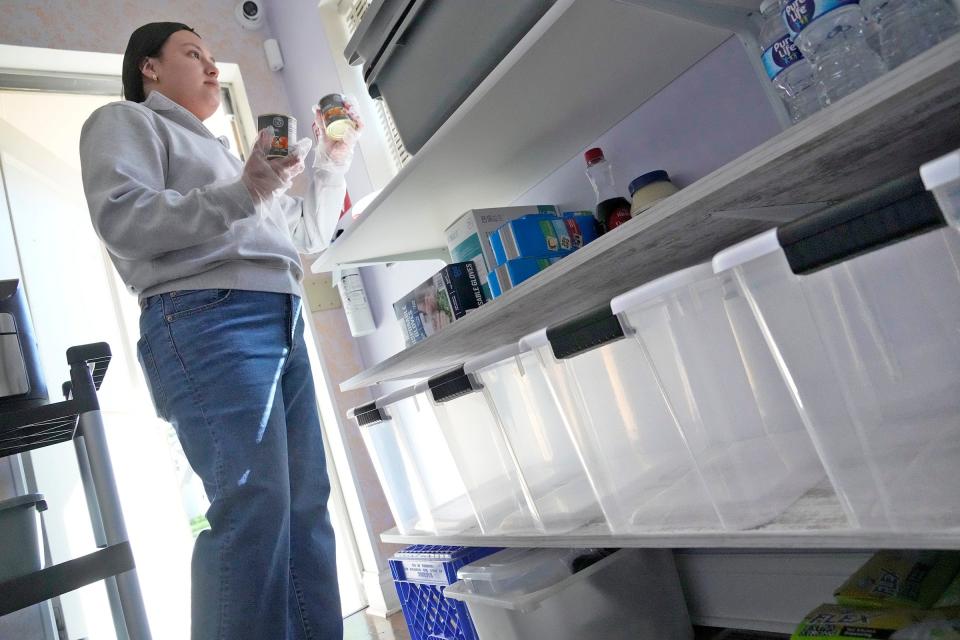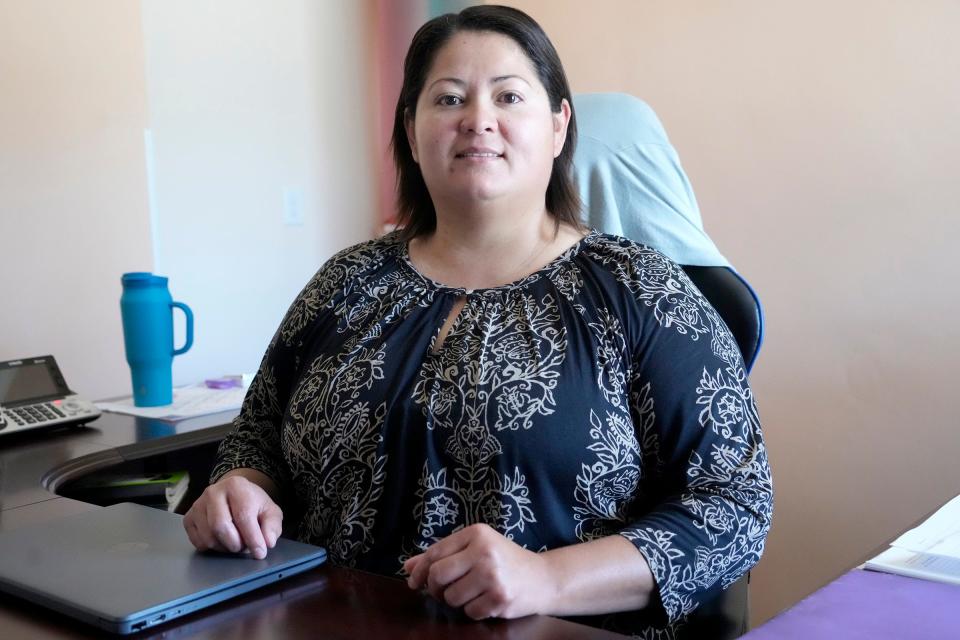'We're not prepared': SDC's sudden closure leaves people scrambling for alternatives
Agueda De Niz, owner of De Niz Child Care Center on the north side, is juggling more work with less funds since the Social Development Commission unexpectedly shuttered its youth food program.
The anti-poverty agency abruptly suspended operations and laid off its employees last month, leaving residents, social agencies and community groups scrambling to find alternatives to the agency's programs.
On top of running her child care center’s front office and looking after children, De Niz is now preparing meals and spending hundreds of dollars on groceries weekly. Her daycare has 30 kids, but when school is out for the summer, she'll have another 14 mouths to feed.
"We're not prepared," De Niz said. "We don't have enough staff to go to the store and buy the supplies. It's crazy."
As the weeks tick by, more information about the sudden loss of SDC's 30-plus programs is coming to light.
According to a memo last week, Mayor Cavalier Johnson's office ordered the city to halt all payments to SDC and reallocate remaining funds to other programs. Since then, a financial review of how SDC spent city funds found no evidence of misuse, according to the memo.
The memo said SDC owes contractors at least $219,647. The city is still reaching out to other contractors to see if others are owed money.
The contractors are just one piece of the fallout from SDC's sudden unraveling. Its child care, education, and tax programs are also working to pick up the pieces. Two SDC board members also resigned in recent weeks, including board chairman Elmer Moore, Jr.

State and local officials have expressed concern about the sudden loss of services, including U.S. Rep. Gwen Moore and Ald. Milele Coggs, who said they have received phone calls from affected constituents.
Ald. Larresa Taylor, who represents the city's far northwest side, said SDC's collapse is impacting the city's most economically challenged residents.
"They need that resource," Taylor said. "We need to figure out how to keep that resource going and how to keep it credible."
City investigation finds 'no evidence of misuse' of funds
According to the May 9 memo, the city learned SDC was not keeping up with contractor payments in March.
Since then, the Department of Administration and city have reviewed the $10.4 million of American Rescue Plan Act funds awarded to the agency. The city is now redistributing unspent funds to other providers to keep SDC's weatherization, lead remediation, and home repair services going.
The largest chunk of ARPA dollars awarded to SDC was from the Milwaukee Health Department’s Lead Remediation Program.
SDC used about $3.2 million of the allotted $7.8 million for lead abatement on 44 homes — a price tag of roughly $72,700 per home.
Members of the city's Finance and Personnel Committee on Wednesday were shocked by the amount SDC spent on each home. However, city staff assured them the cost of lead abatement has increased due to inflation and increased standards for the work.
Staff did notice SDC slowing down work near the end of last fall, Deputy Commissioner of Environmental Health at the City of Milwaukee Health Department, Tyler Weber told the committee. SDC told the city it was having staffing issues but could complete another 80 more units in the next 12 months, Weber said.
"We were like, 'Well, that's significant, are you sure?' And then everything started," Weber said, referring to SDC's abrupt closure.
Habitat for Humanity plans to use about $4 million of the unspent funds to complete lead abatement in another 60 homes, Weber said. However, some committee members were concerned that Habitat for Humanity works exclusively on homeowner-occupied properties, while SDC worked on rentals.
Ald. Scott Spiker, the vice chair of the committee, worried that means fewer children will get the benefits of lead abatement.
Ald. Marina Dimitrijevic, chair of the finance committee, said she was disappointed to learn that SDC didn't use any of the $350,000 awarded by the city's Housing Trust Fund program, which rehabilitates low- to moderate-income homes.
"Not one dime was spent, and it just sat there and sat there and sat there for two years," Dimitrijevic said.
Those funds will be brought in front of the council again to decide how to spend them.
In addition to the ARPA funds, the city awarded another $777,000 in community development block grant and other sources to SDC for neighborhood improvement, homebuyer counseling and job training.
Mario Higgins, director of the city's Community Development Grants Administration, said SDC wasn't completing contracts on time and was having staffing issues.
None of the contracts had been executed, according to the city. The city will select a different provider to continue those programs.
Loss of SDC's youth food program leaves daycares scrambling
Daycare centers are among those most affected by SDC's closure.
SDC provided free food to 31 daycares across the county through its youth food program, which distributed 5,000 meals daily, according to its website.
The state Department of Public Instruction and the nonprofit Hunger Task Force have since reached out to daycares to help fulfill their food needs.
Hunger Task Force works with only nonprofit agencies, Tussler said. But it made an exception after hearing the news of SDC's abrupt suspension. It is collaborating with the Milwaukee Center for Independence to distribute prepackaged healthy meals to daycares that relied on SDC's services.
"I don't know that anyone has any skin in the game that would want to do that kind of work," said Sherrie Tussler, chief executive officer of the Hunger Task Force.
The Department of Public Instruction hosted a Zoom call last week to show daycare operators how to apply for the department's Child and Adult Care Food Program. But the program has a tedious registration process and requires partial payment, De Niz said.
It'll take three months until De Niz starts receiving benefits from the program. And the program covers only about half the cost of food. SDC's program cost her daycare nothing, she said.

Jeanette Barquet, owner of Happy Days Day Care Center on the south side, expressed dismay over the late notice daycare operators received about the closure.
She said the quality of SDC's program declined in the past year and a half. When she first opened her childcare center in 2003, SDC provided meals that included pork chops and chicken. As of late, meals were more likely to feature peanut butter and jelly sandwiches.
Yet, Barquet relied on the program to provide food to her daycare. Now she squeezes in frequent trips to the grocery store — spending hundreds of dollars each time.
"It has created chaos for us,” she said.
High school diploma, weatherization programs continue without a hitch
Other SDC programs are having a smoother transition.
All 39 students in SDC's High School Equivalency Diploma program are still on track to graduate come May 20, according to Sadique Isahaku, head of academic strategy and innovation at Milwaukee Area Technical College. The free 16-week program includes lessons in math, language, employability, social studies and ends with students receiving a diploma.
For decades, MATC staff taught students in the program under SDC's roof. When SDC closed, the program lost its classroom, Isahaku said.
MATC quickly identified the campus closest to the current students, which was the West Allis location, and gave students parking passes, ID cards and access to campus resources, such as the library.
"It is very important for us that these students get a seamless transition," Isahaku said.
As for SDC's weatherization program, La Casa de Esperanza and Partners for Community Action are splitting customers down the middle, according to Partners for Community Action executive director Karin Kirchmeier.
"I think everybody was surprised by the closure of SDC," Kirchmeier said. "Right now, the most important thing is the service to all the consumers."
Little clarity about VITA tax program
Meanwhile, many people who were utilizing SDC's free tax preparation program are still waiting for more clarity.
The IRS promptly reached out to SDC after hearing about its closure, said Christopher Miller, an IRS spokesperson.
SDC filed about 400 tax returns before the agency closed its doors, said SDC attorney William Sulton. The agency has another 800 returns it needs to file, Sulton said.
He said about 35 volunteers will assist with finishing up clients' taxes at his law firm office. The IRS and SDC do not have a date set for when they will begin submitting the remaining tax filings.
Miller said the IRS will be contacting taxpayers about how to move forward and is "working hard to help taxpayers caught in this situation."
SDC board faces its own challenges as employees await paychecks
Without a single paid employee, SDC's Board of Commissioners and Sulton are charged with piecing the beleaguered agency back together. All are working on a volunteer basis.
The board has met weekly — with the bulk of the multi-hour meetings in closed session — since the agency shuttered its doors.
Moore, the board's chair of nearly five years, told the Journal Sentinel he resigned shortly after the agency decided to suspend operations.
Moore said he wasn't given "consistent or reliable" information from SDC's finance director Patrick Kirsenlohr leading up to the discovery in March that the agency had "misallocated" funds. Kirsenlohr was terminated in April.

"It was just untenable and navigating a solution felt to be impossible, so I stepped down," said Moore, who is the head of the Wisconsin Housing and Economic Development Authority.
University of Wisconsin-Milwaukee vice chancellor Joan Nesbitt, who joined the board just last month, also resigned.
The new chair is former state representative Barbara Toles, who has been on the board for four years. At a board meeting last week, Toles said the agency still does not know when employees will receive their final paychecks.
Sulton said SDC hopes to hire a chief information officer to assist with records requests. As of now, Sulton is the only person processing records requests for SDC, and he doesn't have access to the agency's emails or office records, he said.
Editor's note: This article was revised to reflect a city employee's current job title.
Gina Castro can be reached at GCastro@gannett.com. La Risa Lynch can be reached at LLynch@gannett.com.
Cary Spivak of the Journal Sentinel contributed to this report.
This article originally appeared on Milwaukee Journal Sentinel: SDC's sudden closure leaves people scrambling for alternatives

